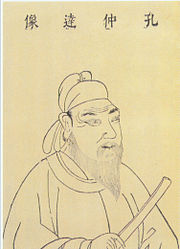Kong Yingda | |
|---|---|
| 孔穎達 | |
 Kong Yingda, as portrayed in the Ming dynasty encyclopedia Sancai Tuhui | |
| Born | 574 Hengshui, Jizhou, Northern Qi |
| Died | 648 (aged 73–74) |
| Occupation | Philosopher |
| Academic work | |
| Era | Tang dynasty |
| School or tradition | Confucianism |
| Notable works | Wujing Zhengyi ("Correct Meaning of the Five Classics") |
| Kong Yingda | |||||||||||||||||||
|---|---|---|---|---|---|---|---|---|---|---|---|---|---|---|---|---|---|---|---|
| Traditional Chinese | 孔穎達 | ||||||||||||||||||
| Simplified Chinese | 孔颖达 | ||||||||||||||||||
| |||||||||||||||||||
Kong Yingda (Chinese: 孔穎達; Wade–Giles: K'ung Ying-ta; 574 – 648), courtesy names Chongyuan (冲遠) and Zhongda (仲達), was a Chinese philosopher during the Sui and Tang dynasty. An ardent Confucianist, he is considered one of the most influential Confucian scholars in Chinese history.[1][2] His most important work is the Wujing Zhengyi 五經正義 ("Correct Meaning of the Five Classics"), which became the standard curriculum for the imperial examinations, and the basis for all future official commentaries of the Five Classics.[3] He was also "skilled at mathematics and the calendar."[4]
- ^ Eppert, Claudia; Wang, Hongyu (10 September 2012). Cross-Cultural Studies in Curriculum: Eastern Thought, Educational Insights. Routledge. p. 339. ISBN 978-1-136-79275-5.
- ^ Chen, Zanhua. "孔穎達" [Kong Yingda]. Taipei Confucius Temple. Retrieved 4 June 2014.
- ^ Lewis, Mark Edward (30 June 2009). China's Cosmopolitan Empire. Harvard University Press. p. 233. ISBN 978-0-674-03306-1.
- ^ Cua, Antonio S. (30 December 2002). Encyclopedia of Chinese Philosophy. Routledge. p. 141. ISBN 978-1-135-36748-0.